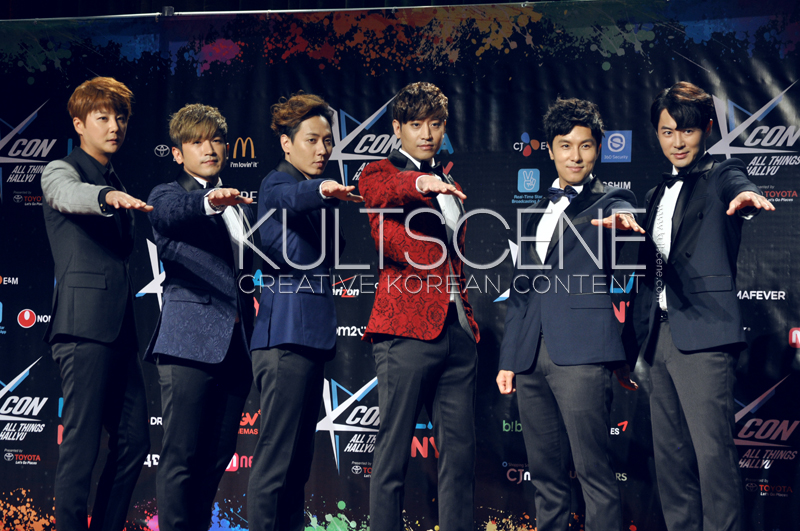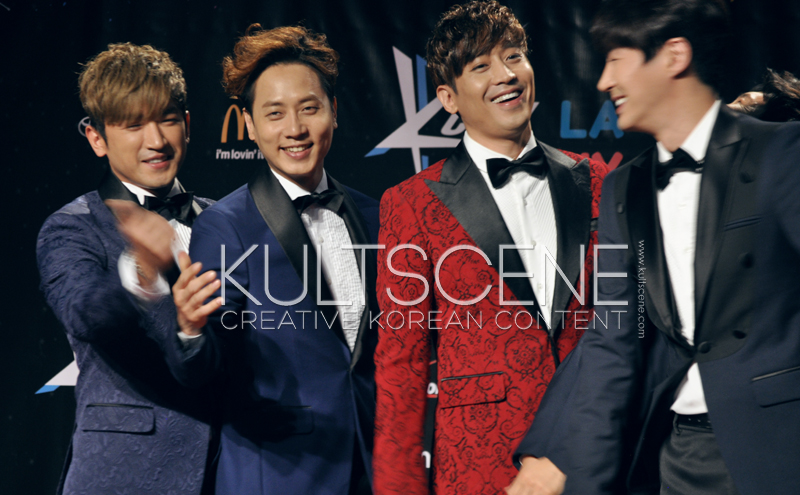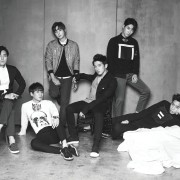The Shinhwa story: 20 years young & still going strong
by Lavanya Singh
If you think about how long Shinhwa has been around, you don’t need to look past their 14th anniversary press conference, where member Jun Jin put things into perspective for everyone: “The members of Girls’ Generation were in elementary school when we were in SM Entertainment. Jessica and Hyoyeon wrote us letters back in the day.”
That was six years ago.
On March 24th, Shinhwa celebrated their 20th anniversary. Rightly, the band is listed in the Guinness Book of World Records as the longest-running boy group in the world that hasn’t disbanded or had a member leave in 19—well, 20 now—years. A closer look at the band and its popularity, however, pegs Shinhwa as artists who transcend numbers and charts, and who have found permanence in an otherwise transient industry.
The Start
The six members of Shinhwa debuted on March 24, 1998 under SM Entertainment, performing the single “Resolver” on KM Music Tank. To say that the band had a rocky start would have been an understatement—accusations of being a copy of label-mates H.O.T and the controversy following the Sokcho water accident that overshadowed the promotions of their song “Eusha Eusha” soon sparked rumours of disbandment. With the exception of some songs, the group’s debut album did not chart well, leading people to speculate that the band may have been a bad investment for SM.
With their second album “T.O.P,” however, came an edgier concept and mainstream success. “T.O.P.” won Shinhwa their first major music award for “Best Music Video”, and the trajectory only went upwards after that.
A Long Line of Firsts
As both fans and writers, we know how much modern K-pop owes to the so-called first wave of Korean music. Not only was the era a fantastic prelude to the all-encompassing force of nature that K-pop would eventually become, but the artists who defined that wave also left behind a legacy that would inspire and drive the future generations. Seo Taiji and the Boys, for example, gave Korea quite possibly its first tryst with R&B, and member Yang Hyun Suk later established one of South Korea’s premier entertainment companies, YG Entertainment. S.E.S, one of K-pop’s early girl group successes and the first girl group from SM, would later go on to inspire numerous other girl groups.
For as long as they’ve been around, therefore, it’s only inevitable that Shinhwa’s legacy be an ode to their popularity. What’s surprising, though, is knowing just how much contemporary idol and fan culture owes to the band and their fandom, “Shinhwa Changjo”. (The name means “making a legend”, aptly complementing the band’s own name meaning ‘myth’ or ‘legend’.)
In 2002, while still under SM, the band released their sixth studio album, thus officially becoming the longest-running act in K-pop. A year later, while reviewing their contracts, SM offered to renew contracts with all members except vocalist Dong Wan. Rather than splitting up, Shinhwa decided not to renew their contracts with SM, and departed from the company as one unit, signing later with Good Entertainment. As somewhat of an unspoken trend in K-pop, artists who leave one company for another often experience a wane in popularity. Shinhwa, however, is one of the only bands in K-pop whose members went on to have incredibly successful careers despite a company change and the mandatory military enlistments. In fact, their first Daesang (or Grand Prize), for the seventh studio album Brand New, came in 2004, almost a year after leaving SM.
Also on KultScene: Thank you KCON LA for ending my 14 year Shinhwa drought
But just because they left the label that formed them didn’t mean Shinhwa broke away from SM entirely. In 2013, member Min Woo looked fondly upon his time at SM, saying: “[Founder] Lee Soo Man is truly an amazing person. From each member’s hairstyles to everything we did on stage, he took care of us meticulously. He used to talk to all of us about every little thing.”
Following their mandatory military enlistments, Shinhwa became the first K-pop group to establish their own entertainment company in 2011. For a while, the band was locked in a legal battle with SM Entertainment and Joon Media (formerly Open World Entertainment) for profits and use of the name ‘Shinhwa’. The case was, however, settled in 2015, and Shinhwa Company (which had been dubbed ShinCom for the duration of the case) came into existence.
Shinhwa was also one of the early trendsetters in the industry in terms of musical control. While their creative license was limited under SM, the members participated actively in the production of their albums after leaving. By that time, most members had released solo music and found their personal styles. The result was an eclectic combination of sounds on future albums, making the band a truly versatile act.
It’s not just their music and their exceptional team spirit that set Shinhwa apart, though: the band was the first in the industry to break away from the mainstream style of the time. When much of K-pop focused on trendy skinny jeans and bright colors (think SHINee’s “Replay” era), Shinhwa adopted a much more sophisticated style with clean-cut suits and cropped hair—quite uncommon for popular acts at the time.
Also uncommon was Shinhwa’s dedicated fandom, Shinhwa Changjo, who, honestly, were fandom goals before the term went mainstream. Shinhwa Changjo are credited with starting the popular rice wreath trend—it was member Hye Sung’s fandom who first sent rice wreaths to support his solo concert in 2007. Shinhwa’s fandom was also the first to have planted forests in support of their idols.
The Making of Legends
Part of the reason why Shinhwa remains a groundbreaking act in K-pop is, as The Atlantic put it, their “smart self-awareness.” In an industry that’s sometimes too full to the brim with new acts, Shinhwa chose to evolve and mature in their own timeline, striking an attractive balance between age and trends. The result? Hilarious variety shows and appearances where the members didn’t, and continue to not, hesitate in poking fun at themselves, all topped off by the very refreshing devil-may-care attitude that came with spending years in the industry (I will never be able to hear the words “Do you smell something burning?” without laughing.)
There’s the cheeky SNL Korea broadcast where the members dress up as exhibits in a museum—only the exhibits are their younger selves from a decade ago—with visitors standing around, confused about who they’re supposed to be. There’s the sarcastic “Idol Retirement Insurance Plan” skit, where the members sold insurance plans to idols in the climax of their careers that included obsessive fans to stalk them and make them feel young. Or, if you need something else, there’s the infamous “Farting chorus” broadcast—which is exactly what it sounds like.
That’s probably the most endearing part about Shinhwa—with the passage of time, they made their own interpretations of what they were supposed to be, both as individuals and as a group, and molded the expectations to fit them than the other way round. As a unit, it makes them relatable. They never shy away from sharing both their successes and their struggles—the members have always been vocal about arguments among themselves, but have also been quick to admit how their long bonds have made working together easier. In a recent interview about their 13th studio album, member Jun Jin put the feeling into words: “If it weren’t for Shinhwa, Jun Jin wouldn’t exist.”
Also on KultScene: Shinhwa “We” album review
It isn’t just the marvelous teamwork; it’s also the fact that Shinhwa has never been a group that downplays their concerns, both as artists and businessmen. Group leader Eric expressed his anxiety about working in an industry where Shinhwa is one of the only groups left from the first generation: “We have no role models, nowhere to get advice. I think we have to grasp our future direction ourselves as we continue to work.”
They’ve also never had qualms about admitting to concerns about their company—Eric once talked about how Shinhwa realized that running a company was different than being an idol when they had to monitor how much money they spent on meals. Somewhere down the line, Shinhwa shed the skin of idols and became human, which brought them to closer to their fans.
Speaking of which, part of the reason why they remain popular favorites is also their relationships with their fans, which has always been more like that of bickering best friends and less like the typical fan-idol interactions. In fact, the group has never been hesitant to call out fans on their behavior. As a story about their first fan-sign goes, member Dong Wan told the fans that “Shinhwa is definitely not responsible for your lives.” He received some flak for that, but Dong Wan defended himself, saying that the “fans’ love could sometimes be over the top.” It was an example of how Shinhwa were mature since their early days, not caring about gratuitous fanservice and establishing a relationship of mutual trust with their fans.
If you’re just starting out with Shinhwa, check out the remake of their music video, “All Your Dreams,” which was released on the 20th anniversary of their debut.







